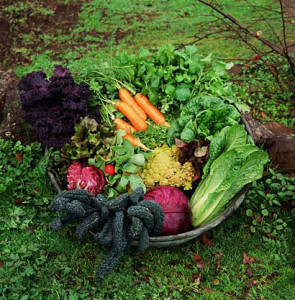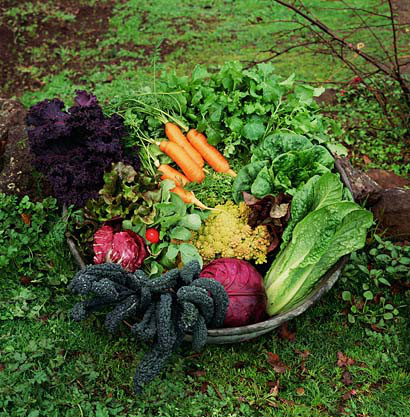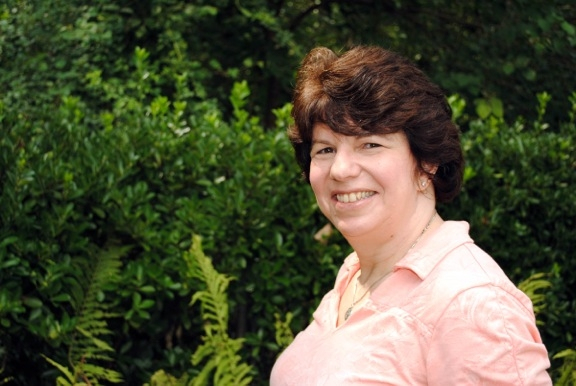This is Senior Fellow Dr. Lyndon Haviland’s first blog post for CHMP. Dr. Haviland has more than 25 years experience in domestic and international public health. She brings broad expertise in management consulting, health policy, advocacy, social marketing, corporate social responsibility, and branding, as well as applied research design and evaluation.

Bowl of Colorful Fall Harvest
I am obsessed with food – it’s one of the defining factors of my life. I like to eat, I like to cook, I like to feed people, I like to talk about food, I like to read about food, and I just love to shop for food. I think farm stands, and good grocery stores are little bits of heaven on earth. And this year, I have become fascinated by my first kitchen garden. With childish wonder, I have watched food grow and picked fruits and vegetables just in time to cook them.
Its summer in Connecticut, and so I am swimming in tomatoes and herbs – I am experimenting with new sauces, tarts, and soups. The more I eat from my garden the healthier I feel. It’s amazing to me, I am learning what we all should know, and that the closer we are to our food, the easier it is to make healthy food choices. In fact, the fresher the food, the less I crave salt, fat and sugar. And that’s good given my family history of heart disease and obesity and my personal struggles to attain and maintain a healthy weight.
You don’t need a degree in public health to believe that there is an epidemic of childhood obesity sweeping across America. Walk a city sidewalk, stroll in the mall and just take a quick look around at the number and size of our youngest citizens. One in three children in America today are overweight, and that has profound implications for their future wellbeing. Being obese is bad for a child’s physical health, but the stigma associated with being overweight or obese is damaging to children’s mental health as well. Teachers as well students have a well documented negative perception of obese children. “Research now shows that future peer victimization can be predicted by a child’s weight.”
Many of the responses to this preventable and dangerous epidemic include bringing children closer to their food and providing healthy food choices. There are no easy answers, but there is a lot of excitement from Michelle Obama’s leadership in “Let’s Move” to New York’s Wellness in the Schools program led by chef Bill Telepan or the burgeoning movement for schoolyard gardens.
That’s why on the morning of August 17 NPR’s business news rocked my world. Target, the nation’s second largest discount retailer beat their earnings expectations (during the current financial down turn) because of their decision to become a “grocery shopping destination.”
NPR reported that Target’s overall sales were up, but most of the expanded earnings came from their increased food offerings. I shop at Target, and I love their attitude, it’s fun and I think they do a great job with paper products, inexpensive home wares, and seasonal party supplies, but when I think food shopping, Target is not my destination.
According to their website, SuperTarget wants to make grocery shopping “fun, easy and affordable.” The website stresses all they ways that Target is a good food purveyor – their designation as a USDA certified organic produce retailer (since 2006), their commitment to meals on a budget, their “better for you options,” and their reformulation of all Archer Farms (their home brand) with zero grams transfat. So this morning, I went grocery shopping at Target.
First the good news, the aisles were wide, the store was well lit, and sale items were easily identifiable. It was easy to see the appeal. Target obviously understands its core clientele, every aisle included single serving portions energy drinks, juice boxes, cheese sticks, 100 calorie packs of crackers or cookies, individual tuna salads, presliced apples, prewashed small bags of carrots and grapes, and no refrigeration necessary pudding packs. I was overwhelmed at the sheer volume of food that can be individually wrapped and sold. Not all of it was appealing and certainly much of it fails to be a “better for you” food option. And since I love to cook, I don’t understand how some of the product reformulation could actually work – what is in a strawberry cupcake from Hostess that allows it to be 100 calories and 0 grams transfat?
In the fresh food section, the offerings were more limited, but again convenience and cleanliness was the order of the day. You could easily shop for school lunches here and please your children well, and Target’s frozen foods included a wide range of prepared foods with an emphasis on simple reheating. A huge sign across one of the freezers summed up their philosophy “eat well, pay less.”
In these economic times, eating well and paying less is great, but the reality at Target was the sheer volume of the processed food far outweighed the “better for you options.” If Target wants to help us eat well, they should eliminate or limit the unhealthy food products or prioritize their healthy food options. This week of 22 sale items highlighted on their website, only 4 were for healthy foods. Why not discount the healthy and fresh food, since the not so healthy and frozen options have a longer shelf life?
SuperTarget should offer discounts on superfoods and not discounts on foods that will supersize their customers. The economics are clear – healthy customers live to shop longer. Making it easier for all of us to stay healthy makes good business sense.
This is Senior Fellow Dr. Lyndon Haviland's







